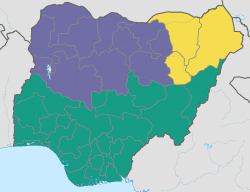Sharia in Nigeria

In Nigeria, Sharia has been instituted as a main body of civil and criminal law in 9 Muslim-majority and in some parts of 3 Muslim-plurality states since 1999, when then-Zamfara State governor Ahmad Rufai Sani[1] began the push for the institution of Sharia at the state level of government.
States
As of 2012, the following 9 states have instituted Sharia:
- Zamfara State (January 27, 2000)
- Kano State (June 21, 2000)
- Sokoto State
- Katsina State
- Bauchi State (June 2001)
- Borno State
- Jigawa State
- Kebbi State
- Yobe State
the following 3 states have also instituted sharia in some parts with large Muslim populations
- Kaduna State
- Niger State (January 13, 2007)
- Gombe State
Controversy
Riots
There have been numerous riots over the implementation of sharia law, primarily involving non-Muslim minorities in the states which implemented the system. One such riot killed over 100 people in October 2001 in Kano State.
Amina Lawal
In 2002, negative light was brought to sharia in northern Nigeria when Amina Lawal, a single mother in Katsina State, was accused of adultery and sentenced to death by stoning by a state Sharia court for conceiving a child out of wedlock; the father was released without conviction for lack of evidence. The conviction provoked outrage both in southern Nigeria and the West, with many national and international NGOs lobbying the federal government to overturn the conviction. In 2004, the conviction was overturned by the Sharia court of appeal, and Lawal returned to private life.
Safiya Hussaini
Executions
In 2002, the first execution of a man under Sharia took place in Katsina State; Human Rights Watch condemned the execution.[2]
See also
{{{inline}}}
References
- ^ Nigeria Sharia architect defends law, BBC News, 21 March 2002
- ^ Nigeria: First Execution under Sharia Condemned, Human Rights Watch, January 8, 2002
